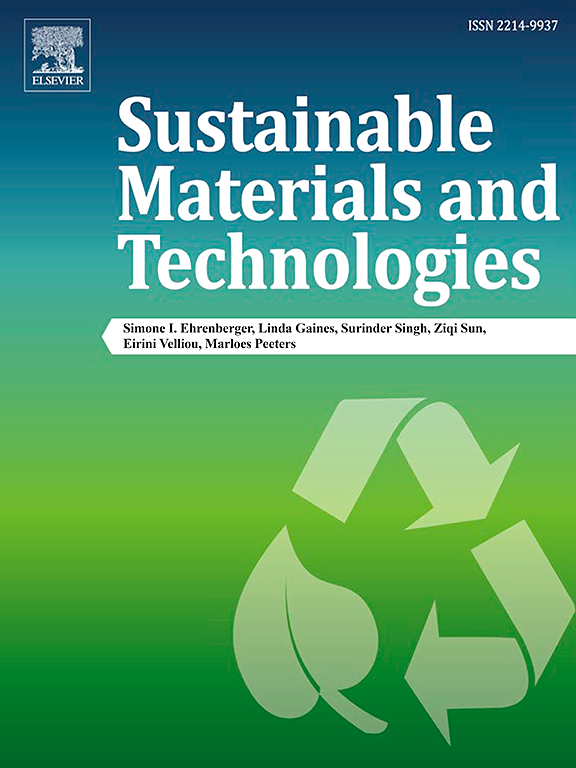Random vibration impact and fatigue life analyses of aluminium tubes in latent heat thermal energy storage systems on refrigerated trucks
IF 8.6
2区 工程技术
Q1 ENERGY & FUELS
引用次数: 0
Abstract
Energy storage systems are paramount in enabling progress towards a zero-emission future. The structural integrity of a latent heat thermal energy storage system for transport of refrigerated food has been investigated for the first time. Fatigue failure is a critical issue for tubes made from aluminium alloys containing phase change material at low temperatures, due to random vibration loads induced by trucks moving on rough roads. Random vibration fatigue life analysis was conducted for tubes with nominal diameters of 50 mm and 32 mm, and thicknesses of either 1.6 mm and 3 mm, using ANSYS Mechanical. The results of the modal analyses showed that the natural frequencies of the tube-PCM systems are higher than 136 Hz. This is outside the frequency domain induced by driving on rough roads, which is between 1 and 100 Hz. Tube-PCM behaves as one solid body when filled with PCM and it is bonded to tube wall resulting in balanced deformation and stress on both sides of a middle support. However, tube filled partly with PCM bonded to tube wall showed an unbalanced distribution of stress concentrated to the side with confined PCM. During cyclic melting and solidification processes, contact between tube and PCM changes where PCM can slide or form a gap. This reduces the maximum stress while still unbalanced between the two sides of tube with and without confined PCM. Tube-PCM with larger ratio of diameter to thickness (Di/t) are more sensitive to contact type, for instance tube diameter of 50 mm and 1.6 thickness compared with tube 32 mm and 3 mm thickness with no sensitivity. The minimum fatigue life was found 2.6 million hours for tube-PCM size 50 mm with 1.6 mm tube thickness. This was assuming a full cycle with minimum to maximum stress ratio equal to one. The lifetime reduced to 2.8 million hours under random vibration cycles with stress ratio equal to 0.5. These results indicate that aluminium tube sizes of 50 and 32 mm with a thickness of 1.6 mm are satisfactory for an expected life of 20 years. Aluminium is well-suited for thermal energy storage in refrigeration due to its low density, excellent corrosion resistance, and high thermal conductivity. The optimal size and thickness depend on the expected lifetime and specific design criteria.
冷藏车潜热蓄热系统铝管随机振动冲击及疲劳寿命分析
储能系统对于实现零排放的未来至关重要。本文首次对用于冷藏食品运输的潜热蓄热系统的结构完整性进行了研究。由含相变材料的铝合金制成的管在低温下疲劳失效是一个关键问题,由于卡车在崎岖道路上行驶所引起的随机振动载荷。采用ANSYS机械分析软件对公称直径为50 mm和32 mm、厚度为1.6 mm和3 mm的钢管进行了随机振动疲劳寿命分析。模态分析结果表明,管- pcm系统的固有频率大于136hz。这是在崎岖道路上驾驶引起的频率域之外,在1到100赫兹之间。当管内填充PCM时,管-PCM表现为一个整体,并与管壁粘结在一起,使中间支承两侧的变形和应力平衡。而部分填充PCM与管壁结合的管道,应力分布不平衡,集中在PCM受限的一侧。在循环熔化和凝固过程中,管与PCM之间的接触发生变化,PCM可能滑动或形成间隙。这降低了最大应力,同时在管的两侧之间仍然不平衡,有和没有限制PCM。直径/厚度比(Di/t)较大的管- pcm对接触类型更敏感,例如直径为50 mm、厚度为1.6的管,而厚度为32 mm、3 mm的管则不敏感。当管径为50 mm、管厚为1.6 mm时,最小疲劳寿命为260万小时。这是假设一个完整的周期,最小与最大应力比等于1。在应力比为0.5的随机振动循环下,寿命降低到280万小时。这些结果表明,尺寸为50和32 mm,厚度为1.6 mm的铝管可以满足20年的预期寿命。由于铝的低密度、优异的耐腐蚀性和高导热性,铝非常适合于制冷中的热能储存。最佳尺寸和厚度取决于预期寿命和特定的设计标准。
本文章由计算机程序翻译,如有差异,请以英文原文为准。
求助全文
约1分钟内获得全文
求助全文
来源期刊

Sustainable Materials and Technologies
Energy-Renewable Energy, Sustainability and the Environment
CiteScore
13.40
自引率
4.20%
发文量
158
审稿时长
45 days
期刊介绍:
Sustainable Materials and Technologies (SM&T), an international, cross-disciplinary, fully open access journal published by Elsevier, focuses on original full-length research articles and reviews. It covers applied or fundamental science of nano-, micro-, meso-, and macro-scale aspects of materials and technologies for sustainable development. SM&T gives special attention to contributions that bridge the knowledge gap between materials and system designs.
 求助内容:
求助内容: 应助结果提醒方式:
应助结果提醒方式:


